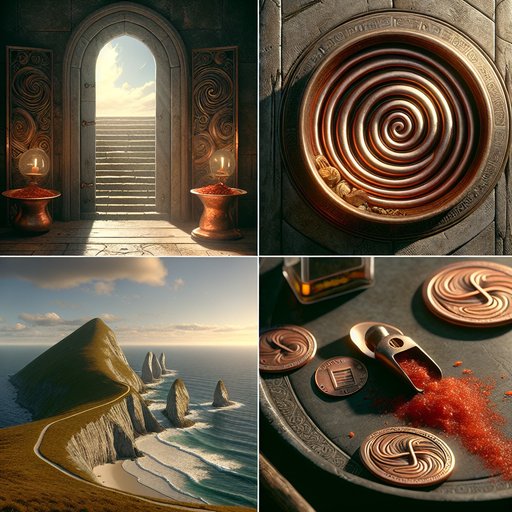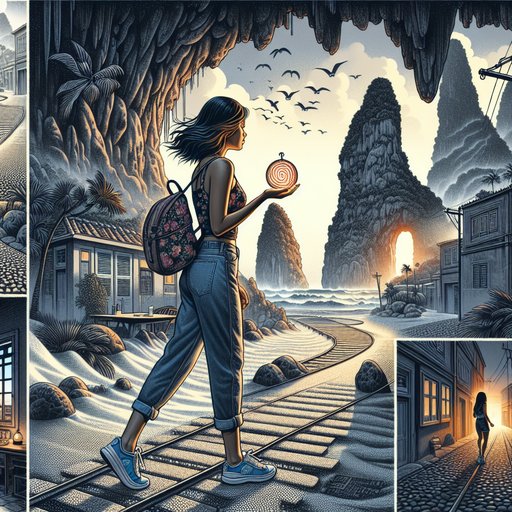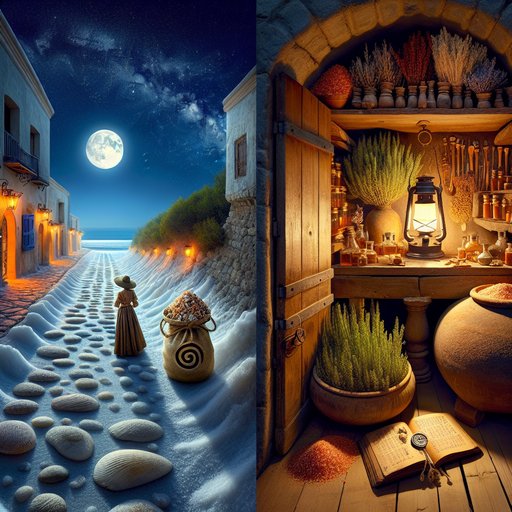CHAPTER 4 - The False Song of the Salt Road

Following a trail of red resin dust, Barbra enters a spiral-carved door behind the perfumer’s shop and discovers a secret room filled with copper bowls and shells etched with spirals and three bars. Using her copper token, she coaxes chords that mirror the cave’s resonance and believes she’s unlocked an acoustic map leading to a sea cave on Socotra’s north shore. Hiking across the wind-carved plateau in her blue and white Asics, she descends to the roaring cave and finds a staged cache—recent resin, imitation coins, and a vellum scrap—revealing her new insight as a decoy planted by those guarding the centuries-old secret. Returning to Hadibo, she wrestles with frustration, consults the perfumer’s wary family, and resolves to start over, questioning every assumption about the token, the ledger scrap, and the meaning of the “salt road.” In her room, she abandons the acoustic theory and considers tides, brine levels, and trade routes, only to find nothing aligns. As she wipes resin dust from her windowsill, three soft knocks echo the token’s bars, and a whispered use of her name suggests a new lead—perhaps finally genuine, or another careful lie.
The resin trail winked like embers along the alley behind the perfumer’s shop, catching glints of moonlight between clots of shadow. Barbra’s tight jeans brushed limestone as she squeezed toward the door carved with a single spiral, her blue and white Asics whispering over grit. She had thrown on her black leather motorcycle jacket against the ocean chill, its weight familiar on her shoulders and reassuringly scuffed. Her freckles prickled with the night’s damp, and she tugged a curl of red hair behind her ear with the same impatient motion her grandmother used to call unladylike.
Still, she pressed her palm to the carved spiral and pushed, ready to dive into whatever waited without asking permission of anyone. The room beyond inhaled resin and old salt, a delicate breath that lifted the fine hairs on her forearms. Oil-light trembled on racks of polished conch shells and shallow copper bowls, each etched with spirals and the same three short bars as her mute token. No one waited within; there was only the hum of distant surf, a throat-sound the limestone had been making since the island rose.
On a low table lay a reed pipe, several pebbles, and a loop of string anchored to a beam with a small hook. Barbra closed the door behind her, the latch settling with a patient click, and let the quiet arrange itself around her. She looped the string through the copper token and lifted it to hang, letting it draw a true vertical in the faint draft. The token spun slowly, catching lamplight along its spiral, while she tapped a bowl with one pebble and felt the tone vibrate against her ribs.
A second bowl added a higher note, and the third, lower, made a chord that softened the corners of the room and called out to the hollow memory of the wadi cleft. The token’s spin wobbled, steadied, and wobbled again, as if the air itself were folding into the frequencies. Barbra sketched the chord on the ledger scrap, marking the bowls’ placement like stars, heat blossoming in her chest as a pattern began to show. She saw it then, or believed she did: the three bars were not tally marks but notes, and the spiral was not a coil of directions but an echo path.
Lay the bowls to match the coastline’s arc and the chord pointed seaward, toward the roar she had heard at the cliffs above Arher. If the salt road sang, it sang there, in the throat between sea and stone, dragging breath through the island’s hidden passages. Her floral denim jacket would have suited sunlight, but the leather was right for night and risk; she checked her backpack, tucked the token into the inner pocket, and slipped back into the alley. She walked quickly, the perfumer’s shutters blinked shut behind her, and the wind pressed its cold palm against her shoulder as if urging her onward.
The plateau rolled out like a sleeping animal under a skin of stars, every dragon’s blood tree a guardian lifting chandeliers to the poured-silver sky. Sand whispered underfoot with each set of steps, the long-worn rhythm of a woman who learned early to move alone and make her own choices. Barbra thought of her grandparents’ kitchen with its stubborn tick of the wall clock and the smell of drying herbs; she could hear her grandfather’s voice telling her to trust what the world showed her and to look twice anyway. Her calves warmed, steady, slightly muscular from years of walking toward answers most people wouldn’t notice.
The cliffs arrived as a sudden drop and a sudden sound, the black breath of the sea rising even before she reached the lip. She found a fisherman’s rope anchored to a rusted piton and leaned back over the void, hands burning, soles seeking purchase on damp stone. The blowholes below coughed mist and song, dark lungs timing their exhale to a moon she could not see from this angle. At the cave mouth the air was cold enough to bite her teeth; the rock wore a gloss from centuries of salt that looked like lacquer.
Her headlamp made careful circles as she stepped into the throat, and the night took her name and threw it back in pieces. When she saw the resin spiral set upon a flat stone, the three bars beside it, and a jar sealed in wax, her chest clenched with the sharp joy of discovery. She knelt, aware of the spray’s fine needles against her cheeks, and cracked the wax with the knife she kept tucked into her backpack sleeve. Coins slid into her palm, clotted with salt; a strip of vellum unfurled, marked with spirals so familiar she almost laughed; a handful of dull pearls rolled like teeth.
The smell of resin rose sweet and bright, like the perfumer’s morning batches when the shop’s shutters rattled open. She whispered a thank you—habit, reverence, relief—and imagined the vellum framed in the glass cabinet across from her couch at home, where rain would tick against the window and she would tell the story to whomever asked. For a moment, the island’s silence felt like consent. Then the edge of doubt slid in, thin and cold as a fish’s back.
The resin here was too fresh, its scent unweathered by the cave’s brine and old breath; one coin’s edge showed a factory burr her fingers knew to distrust. A drop of spray touched the vellum and the ink bled at once, not with the slow dignity of age but with a cheap impatience. Barbra’s jaw set; she nested the items back as she’d found them, matching angles and dust, letting the staged tableau reseal itself like an old wound pressed flat. Whoever watched her had led her cleanly by the nose, and she let the anger settle into a small, bright coal that could warm, but not burn.
The rope bit her palms on the climb, and by the time the plateau leveled beneath her again the stars had shifted as if to look down and judge. In Hadibo the streets glimmered with spilled lamplight and night voices; the perfumer’s door opened to her gentle knock as if it had been waiting. His wife brought tea with three sugar cubes in a neat spill, and the old grandmother watched from the threshold with eyes that knew how to carry secrets without spilling a drop. Barbra didn’t accuse, didn’t demand; she asked after the weather and the quality of the resin and let gratitude soften the air.
She would start over, she told herself, without drama or complaint, because that was how she kept faith with the small girl who learned to do for herself. Back in her room above the shop, she set the token and ledger scrap on the desk and shed her jacket, damp at the cuffs with sea spray. The mirror caught her freckles and she frowned at them by reflex, then smiled despite herself at the stubborn stranger she never quite wanted to befriend. Her Louboutins slept in their box from last night’s music, immaculate and proud; she flexed her toes in their Asics, feeling the day’s journey in the ache.
The resin spiral on her windowsill waited with its three tiny cuts, the admission she had not misread earlier, only misunderstood. Salt road, she thought, could be a caravan route, a brine path across pans where wind carved arabesques that once had meant something to someone with time to carve them. She tried the token without sound this time, suspending it over a shallow dish of brine, watching the spiral catch and pull eddies into petal shapes. Three bars could be water levels, the story of monsoon and doldrum recorded as marks on a trader’s door; the spiral a gauge of swirl that told when ships should not venture near the reef.
She set the ledger scrap beside her grandmother’s old measure of patience and compared, but nothing resolved to a clear picture. A gust from the alley rattled the shutters, lifting glints of resin dust from the sill; she brushed it into a neat fold of paper and tucked it into her notebook like a pressed flower. If the false song had led her to a decoy, then the true song would require a different ear, and she emptied herself of certainty the way a cave empties of tide. The first knock was so soft she thought it was her pulse in her ear, the second a confirmation, the third exactly matched to the rhythm of those three stubborn bars.
Barbra froze, breath held, fingers sliding the copper token into her pocket until the spiral’s edge warmed her palm. On the sill the resin spiral had been cut anew, a fresh notch gleaming where there had been none, as precise as a signature in wet clay. She slipped back into her floral denim jacket, feeling its bright threads like armor against the dark, and moved to the door with the measured calm she’d practiced since childhood. When a voice spoke her name through the salt-wet wood, low and careful, how could she know whether this was the guide she needed—or the next deception waiting with a smile?


































































